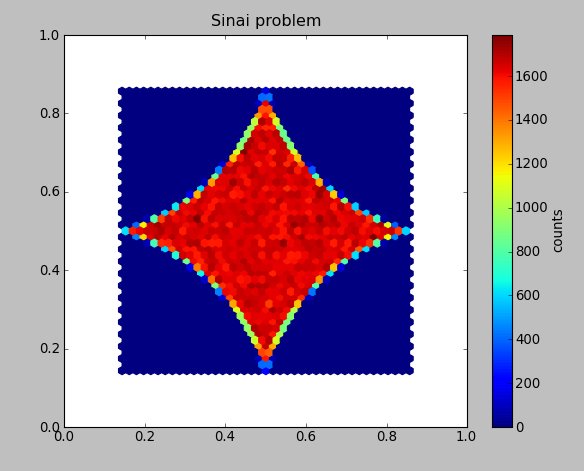ICFP NumPhys Paris: Difference between revisions
Wiki-cours (talk | contribs) No edit summary |
|||
| (148 intermediate revisions by 3 users not shown) | |||
| Line 1: | Line 1: | ||
__NOTOC__ | __NOTOC__ | ||
= | [[File:CFP_2018_sinai.jpg|600px|thumb|Sinaï's billard]] | ||
= HW3 = | |||
The due date has been changed to '''Monday 23th @10:00pm'''.<br> | |||
Please send your file in html format to '''guillaume.roux@u-psud.fr'''.<br> | |||
Points will be removed proportionality to the delay after that date. | |||
= Oral exams December 9-11 AND FRIDAY 13= | |||
'''New slots have been added on Friday morning 13th'''. Fill them up. | |||
Each interview lasts 20' and will take place at the ENS. | |||
'''Fix your exam slot''' starting by now [https://docs.google.com/spreadsheets/d/1g-T2k-NdcPdvruAdOMfU9MPBqmD7AUXph1XkSng0wVo/edit?usp=sharing on this page] | |||
First arrived, first served. In case of any issue, please take contact with us by e-mail. Good luck! | |||
= Course description = | |||
<div> | |||
NumPhys is a general course in Computational Physics, with applications in Statistical Physics and Condensed Matter. | |||
We cover the many algorithms used in modern many-body problems: molecular dynamics, Monte Carlo (classical and quantum), exact diagonalization and optmization in complex landscapes. Implications to computer science are also discussed. We focus on algorithms and physics, not on programming and heavy numerics. The theoretical lecture is followed by a tutorial introducing many concrete numerical exercises. You will have to hand in 3 homeworks. | |||
</div> | |||
= Team = | |||
* [http://lptms.u-psud.fr/alberto_rosso/ Alberto ROSSO] ([http://lptms.u-psud.fr/ LPTMS, CNRS et Université Paris-Sud, Orsay]) | * [http://lptms.u-psud.fr/alberto_rosso/ Alberto ROSSO] ([http://lptms.u-psud.fr/ LPTMS, CNRS et Université Paris-Sud, Orsay]) | ||
* [http://lptms.u-psud.fr/membres/groux/ Guillaume ROUX] ([http://lptms.u-psud.fr/ LPTMS, CNRS et Université Paris-Sud, Orsay]) | * [http://lptms.u-psud.fr/membres/groux/ Guillaume ROUX] ([http://lptms.u-psud.fr/ LPTMS, CNRS et Université Paris-Sud, Orsay]) | ||
* [https://www.lps.u-psud.fr/index.php?page=pageperso&nom=CIVELLI&prenom=Marcello&lang=fr Marcello CIVELLI] ([https://www.lps.u-psud.fr/?lang=en LPS, Université Paris-Sud, Orsay]) | * [https://www.lps.u-psud.fr/index.php?page=pageperso&nom=CIVELLI&prenom=Marcello&lang=fr Marcello CIVELLI] ([https://www.lps.u-psud.fr/?lang=en LPS, Université Paris-Sud, Orsay]) | ||
==== | = Schedule = | ||
* Lectures on Fridays: 14.0-16.00 | |||
* Tutorials on Fridays: 16h00-18.00 | |||
* ENS, 24 rue Lhomond, room Conf IV (2nd floor) | |||
Here you find the scheduling of | |||
[https://docs.google.com/spreadsheets/d/1NlHTj7ypYoVyy6c9jpq-93NxDryAfbvy1vnOgA3ucPE/edit#gid=245193379/pubhtml Lectures, Tutorials and Homeworks] | |||
<!-- | |||
[https://docs.google.com/spreadsheets/d/e/2PACX-1vS0bnp7cPVTnbxd77_y-QRiuMzLGKq7DOIKsI-LpoXZvOk43ykDL_glD6RlPd9ubz-9RL12Xh_a9igE/pubhtml Notes and Tutorials]--> | |||
<!-- | |||
<iframe src="https://docs.google.com/spreadsheets/d/e/2PACX-1vS0bnp7cPVTnbxd77_y-QRiuMzLGKq7DOIKsI-LpoXZvOk43ykDL_glD6RlPd9ubz-9RL12Xh_a9igE/pubhtml?gid=245193379&single=true&widget=true&headers=false"></iframe> | |||
--> | |||
= Language = | |||
The working language for this course is English.<br> | |||
Programming Language: Python 3. See [[Memento Python]]<br> | |||
'''No previous experience in programming is required.''' <br> | |||
You need first of all to have [[Installing_Python |Python installed]] with at least modules NumPy, SciPy and matplotlib. | |||
= Grading = | |||
3 homeworks (10 points each) + 1 MCQ (20 points) + 1 oral exam (50 points) | |||
= WIFI = | |||
The WIFI network is: '''PHYS-GUEST''' | |||
The WIFI password for this networks is: '''PhysiqueENS''' | |||
Then you can run a navigator (Firefox, Chrome, IE, Safari...) | |||
Accept the certificat and enter the password: '''numerical.physics@phys.ens.fr''' | |||
= Forum = | |||
[http://numphys.forumactif.com/ here it is] please register | |||
== References == | |||
* [http://www.lps.ens.fr/~krauth/index.php/SMAC SMAC W. Krauth Statistical Mechanics: Algorithms and Computations (Oxford: Oxford University Press) (2006)] | |||
* Other references are specified in each lectures | |||
Latest revision as of 12:45, 14 December 2019
HW3
The due date has been changed to Monday 23th @10:00pm.
Please send your file in html format to guillaume.roux@u-psud.fr.
Points will be removed proportionality to the delay after that date.
Oral exams December 9-11 AND FRIDAY 13
New slots have been added on Friday morning 13th. Fill them up. Each interview lasts 20' and will take place at the ENS. Fix your exam slot starting by now on this page
First arrived, first served. In case of any issue, please take contact with us by e-mail. Good luck!
Course description
NumPhys is a general course in Computational Physics, with applications in Statistical Physics and Condensed Matter. We cover the many algorithms used in modern many-body problems: molecular dynamics, Monte Carlo (classical and quantum), exact diagonalization and optmization in complex landscapes. Implications to computer science are also discussed. We focus on algorithms and physics, not on programming and heavy numerics. The theoretical lecture is followed by a tutorial introducing many concrete numerical exercises. You will have to hand in 3 homeworks.
Team
- Alberto ROSSO (LPTMS, CNRS et Université Paris-Sud, Orsay)
- Guillaume ROUX (LPTMS, CNRS et Université Paris-Sud, Orsay)
- Marcello CIVELLI (LPS, Université Paris-Sud, Orsay)
Schedule
- Lectures on Fridays: 14.0-16.00
- Tutorials on Fridays: 16h00-18.00
- ENS, 24 rue Lhomond, room Conf IV (2nd floor)
Here you find the scheduling of Lectures, Tutorials and Homeworks
Language
The working language for this course is English.
Programming Language: Python 3. See Memento Python
No previous experience in programming is required.
You need first of all to have Python installed with at least modules NumPy, SciPy and matplotlib.
Grading
3 homeworks (10 points each) + 1 MCQ (20 points) + 1 oral exam (50 points)
WIFI
The WIFI network is: PHYS-GUEST
The WIFI password for this networks is: PhysiqueENS
Then you can run a navigator (Firefox, Chrome, IE, Safari...)
Accept the certificat and enter the password: numerical.physics@phys.ens.fr
Forum
here it is please register
References
- SMAC W. Krauth Statistical Mechanics: Algorithms and Computations (Oxford: Oxford University Press) (2006)
- Other references are specified in each lectures
